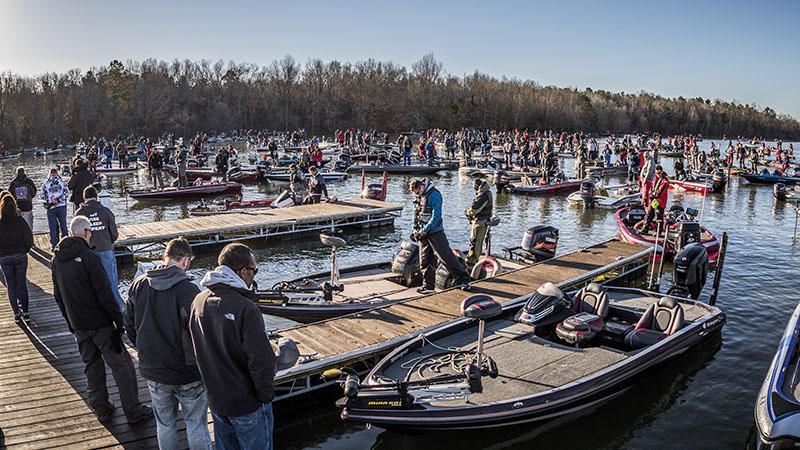Bass Fishing Club on the Rise

Members of the VMI bass fishing club were among the anglers preparing to leave the dock for the Fishing League Worldwide College Open on Kentucky Lake March 6.—Photo courtesy of Matt Pace/FLW.
LEXINGTON, Va., April 25, 2018—Members of the Institute’s bass fishing club braved harsh conditions on Kentucky Lake as they competed against hundreds of collegiate anglers from across the county at the Fishing League Worldwide College Open held March 6-7.
Four cadets—Jacob Novak ’18, Wyatt Novak ’20, Tony Schultz ’20, and Paul Brown ’20—made the trip to western Kentucky to compete on the water for 15 hours over the two days of the tournament.
“The lake was flooded by over 15 feet to begin with but the real problem was 30 mile per hour winds each day,” said Jacob Novak. “While driving across the middle of the lake it was not uncommon to run into 4-5 foot waves. Five boats sank during the tournament and several others had to be rescued. The weather was so bad that 110 boats didn’t catch a single keeper on the first day.”
Amidst the challenging weather, the largest catch of the team over the two-day competition was from Wyatt Novak—an impressive 4 1/2-pound largemouth.
Competing at this high level was a milestone for members of the club, which emerged last spring, when Schultz asked fellow cadets if they would be interested in starting a bass fishing team at the Institute.
“I decided it was the perfect time to start. I was only a Fourth Classman, so I knew I had time to mold the club,” recounted Schultz. “I can’t believe how quickly it fired up.”
The new club gained more steam when Army ROTC instructor Sgt. 1st Class Clifton Sanders agreed to be faculty adviser. After generating a budget and accumulating a dozen sponsors, members were able to conduct regular meetings and travel for competitions. The club currently has 53 cadets on its roster with a range of fishing experience.
“There are people in the club that have been fishing tournaments for years. There are people in the club that just like to go out with a bobber, worm, and a pond and catch fish all day, so we have a little bit of everything,” said Schultz.
Within the larger club roster is a core group of cadets dedicated to the sport of bass fishing. Those cadets have the opportunity to travel and compete, representing the Institute in bass fishing tournaments throughout the region.
With practice being held every Sunday, many club members are able to get out and fish the local waters, including boat fishing on the James and Maury rivers. This is also a time for cadets to conduct boat maintenance and to rig up fishing rods. Occasionally, cadets have the opportunity to practice fishing at Smith Mountain Lake, where cadets will take part in future competitions.
“This is our home lake and we have very high expectations,” said Jacob Novak. “We have been practicing on this lake since late January and have been putting together a better strategy each time.”
Club members are using that time on the water to hone their skills in addition to developing the focus necessary to succeed in the sport.
“If you’re not on it mentally, if you’re not in it for those eight to ten hours when you’re out there, you are not going to do well because that bite can come at any time and if you’re not ready for it, chances are you’re not going to get that fish in the boat,” said Schultz. “You really have to be locked in when you’re tournament fishing.”
An additional challenge for cadets looking to fish competitively involves the limited opportunity to pre-fish or practice amidst their busy schedules. Despite this, they have found a way to make it work anyway.
“Due to limited time on the water, we usually try to do as much research about the lake as possible,” said Jacob Novak about Smith Mountain Lake. “We check daily fishing reports and try to mimic fishing patterns used by tournament winners in the past.”
In addition to time constraints, the newly formed club currently has fewer resources than the more developed programs against whom they compete. The club currently uses and competes with privately owned boats, and members have been able to use alumni-owned property when setting up camp at Smith Mountain Lake.
“Everyone is chipping in and doing a lot of the things themselves to make this team work and I think that’s what’s awesome,” said Schultz. “We don’t have anything handed to us. We have to work for everything. When we do succeed, it just makes it that much better.”
- H. Lockwood McLaughlin
-VMI-
.svg)
.png)